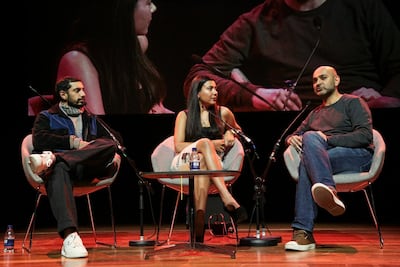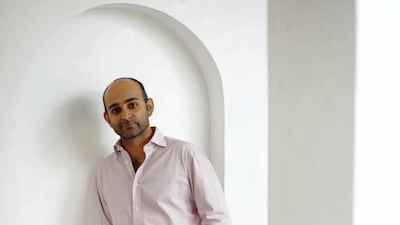Mohsin Hamid is deeply disappointed. Eleven years since the publication of his ground-breaking novel The Reluctant Fundamentalist, what he hoped was a "passing phase" has got worse. Were he to write it from scratch, a 2018 version would bear many similarities to the original because, frankly, "we are still in much the same terrifying mess that we were over a decade ago".
He had already started on early drafts when the 9/11 attacks took place. Growing up in the United States and Pakistan, he felt himself a “hybridised western-eastern creature”, but after 9/11 it was as though a rift was riven down the middle of his dual identity. “The violence, suspicion and profiling that followed affected me personally, as well as politically,” he recalls. “Sadly, there is still a real cleaving of the world into an ‘us versus them’ discourse and a sense of fear, which has not gone away.”
It's a theme he has picked up again in his Exit West, which centres around modern migration, opening on an unnamed Middle Eastern city spiralling into civil war. The narrative slips between reality and make-believe as protagonists Nadia and Saeed flee their city for unknown western lands with no promise of a future.
Hamid is haunted by the possibility that Lahore, where he lives with his wife and children, could go the same way as Damascus, Aleppo, Sarajevo and "other cities in the hinge between Asia and Europe" that have been wrenched apart by ideological tribalism. This nightmare was the starting point for Exit West, where geographic barriers are dissolved by magic portals and migration becomes a universal human reality that defines us all.
Trying to unpack the world today
“Really, we’re all migrants. We just need to recognise it in ourselves and then see what kind of different conversations become possible.” For Hamid, the accident of birth is a poor justification for locking people out at arbitrary national borders. Forcing some to stay in uninhabitable environments, while others enjoy privileged access by dint of birthright exposes “the equality myth that western democracy is built upon”.
People in London or New York may like to scoff at the “rental space model of movement” offered in Dubai and other Gulf cities, but many are incredibly relieved to have this option in a world where the West has walled itself off, Hamid says.
“I think many of us are still trying to unpack this situation where it appears that so many of our fellow citizens from all over the world really do believe they are existentially threatened by people who seem different to them.”
He visited the UK last month for a discussion on migration and magic at the Southbank Centre's 12th London Literature Festival alongside actor and rapper Riz Ahmed, who played the protagonist in Mira Nair's film adaptation of The Reluctant Fundamentalist.

Ahmed visited Lahore last spring, and Hamid, who still feels like an "insider-outsider" there, was intrigued to see his birthplace through fresh eyes as they discussed the shape of Pakistani society; the fabric of the city; music; masculinity; and what passes for cool in Lahore. Re-reading The Reluctant Fundamentalist now, it remains every bit as resonant as it did in 2007, when it spoke to a world still reeling from the events of September 11 in a voice that hadn't then been heard. Changez, the protagonist, navigates the identity crises fragmenting eastern and western societies, first as a wide-eyed Pakistani student in the US, then a young banker climbing the Wall Street ladder.
We watch his quiet, uncomfortable awakening post-9/11 as society starts to view him with suspicion and he, in turn, begins to discern the connection between the crumbling world around him and "the impending destruction of my personal American dream". Back in Lahore it is harder than expected to shrug off the American traits he was eager to absorb.
Art imitating life
In a sense the two novels, both shortlisted for the Man Booker Prize, are mirror images of one another. In Exit West, the protagonists are forced to flee an unnamed city in the Middle East while The Reluctant Fundamentalist chronicles a character trying to shake off the West and reconnect with his eastern upbringing.
This is partly biographical. Hamid had left New York and was living in London when he wrote The Reluctant Fundamentalist but was considering a move back to Pakistan. Changez, who shares a chunk of his biography, makes very different choices "because I wanted to walk down that path with him to see what that felt like, as a way of interrogating the very different path I've taken myself."
Exit West was conceived after living for more than a decade in Lahore and "seeing how many people I know, from close friends to distant acquaintances, desperately want to get out of here". In Pakistan, Hamid says, he has watched what happens when society determines that there should be a hierarchy of citizens based on some "quest for purity".
_______________________
Read more:
Najwa Zebian: writing was genuinely my only way of dealing with the world
Okechukwu Ofili: ‘Western fairy tales are messing with the minds of black children’
Ahmed Mourad: writing a world in which nothing is normal
_______________________
“You end up in a terribly tribalised, fragmented polity which can only be really sustained through brute force and Pakistan is living proof of that.” There are, he feels, unsettling similarities between Pakistan and the polarising discussions in western discourse, but he’s adamant there is no return to the Britain or US of 40 years ago, regardless of the nativist nostalgia whipped up by Brexit and President Donald Trump. “The place we go to if we wish to go in that direction is actually a new place, and I think quite a horrific one.”
As depressing as that sounds, he is optimistic about the future, saying, "I think we have to be."
Letting go of optimism is what lands us in an environment where peddlers of "dangerous, anti-equality, nostalgic positions thrive", he says. There's bounty in a world of more equality, in the food, music and culture of a shared future, and this is a world younger generations are open to.
“I think that’s much more useful than saying it’s looking really, really bad, because in my eyes, people tend to move from that position to a position of saying well, take us back to how it used to be then.”
Divisions over Brexit and Trump in the US are a reminder that, "within these clouds of culture and civilisations that we imagine exist, are countless different people. I think, when we recognise that, we can see that it may not really be westernness of easternness that defines our polarity".
It's good news, he told the festival audience, that human ingenuity is busy developing a "technological other", because this will push people to think of themselves as one group in the face of artificially intelligent beings.

